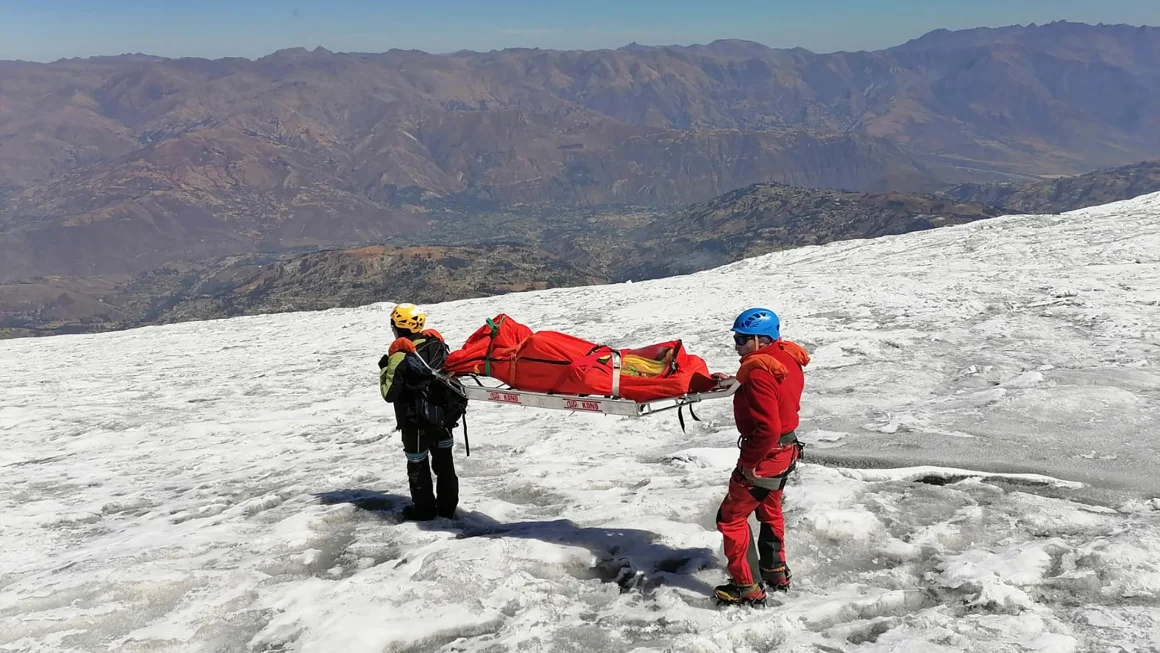American mountaineer’s body found by fellow US climbers 22 years after going missing in Peru
The body of an American mountaineer has been discovered by a pair of fellow US climbers 22 years after he went missing following an avalanche in the Peruvian Andes.
American brothers Ryan Cooper and Wesley Waren found the body of Bill Stampfl on June 27 on Mount Huascaran, according to Joseph Stampfl, Bill’s son.
The climbers had been descending the mountain in Peru’s Cordillera Blanca after an unsuccessful attempt to reach its 22,000 ft summit when they found the body, at about 16,500 ft.

Cooper told CNN Tuesday they noticed an object that didn’t quite blend into the landscape and decided to investigate.
He said the ice had preserved the body and its belongings and Stampfl’s wedding ring, helmet, mountain climbing boots, and jacket were all intact.
The brothers managed to identify Stampfl by finding a bag attached to his body, inside which they found his identification card, a camera, passport, wallet, and glasses – all of which were also intact, Cooper explained.
Stampfl and two of his fellow climbers and friends, Steve Erskine and Matthew Richardson, were all killed by an avalanche on Mount Huascaran on June 24, 2002, his daughter Jennifer Stampfl told CNN on Tuesday. Their bodies were never discovered, except for Erskine’s, she said. Stampfl was 58-years-old at the time.
His body was retrieved and brought down the mountain on July 5 by the Peruvian Mountain Rescue Association and Peruvian National Police after coordination with Cooper and Stampfl’s family.
His body was taken to a morgue in the town of Yungay for an autopsy, Peru’s National Police posted on X on Tuesday.
Finding Bill’s family
Cooper, a native of Las Vegas, Nevada, called his wife and informed her of his discovery the same day he came across Stampfl’s body. He asked her for help in finding Stampfl’s family, as he was still on Mount Huascaran with limited cellular service.
After much online research, Cooper’s wife was able to locate Joseph and called him on June 29.
“I told him I know the location of his dad. I told him about the ring and personal items,” Cooper said.
His motive was to help the family find closure, Cooper explained.
With “no body, there’s no way to find peace with that,” Cooper said.
Cooper also spoke to Jennifer and Stampfl’s widow Janet on the phone before sending photos of Stampfl’s ID and other belongings to the family.
‘My heart just sank’
After so many years, the news came as an emotional shock to Stampfl’s family.
“My heart just sank. After 22 years I had been okay with the fact that he’s there. He’s part of the mountain. Like we’re never going to get him back. The fact that they found him, it opened up all the wounds,” Jennifer told CNN on Tuesday.
“There is no preparation for having your husband killed instantaneously,” Janet said, adding that she never thought her husband’s body would be discovered. “It’s an answer to so many prayers by so many people.”
Janet said her husband loved climbing mountains. “He enjoyed it so much. He said he always felt closest to God when he got to the top of the mountain,” Janet said.
“After 22 years…I was a little shocked, it took me a while to process everything,” Joseph said, adding “now it’s time to bring him home hopefully.”
Following an autopsy in Yungay, Stampfl’s body was transferred to the city of Juarez, Joseph explained. Stampfl will be taken to a funeral home in Lima where he will be cremated, and the ashes will be sent to the family in the United States.
‘A dangerous landscape’
While Cooper is grateful to have finally been able to bring closure to the Stampfl family, the discovery was also tinged with sadness.
He had hoped that Richardson’s body might have been attached to Stampfl by a rope, but that was not the case and “he’s still missing as of today.”
He also fears that global warming may have played a role in his discovery, by thawing the ice on what is considered the world’s highest tropical mountain range.
“He was fully exposed and not in ice anymore. The thawing process happened,” Cooper said.
Since the 1950s, almost all of the world’s glaciers have been retreating, according to a report by the Intergovernmental Panel on Climate Change. On average, the glaciers in the Andean region – Bolivia, Colombia, Ecuador and Peru – have lost over 50 per cent of their coverage since the 1960s.
“The Andes is deteriorating more than any other mountain range in the region,” Cooper said, adding that the changing conditions were part of what had prevented him from summiting Mount Huascaran.
“Glaciers are melting away, the landscape has changed. It poses a dangerous landscape now,” he said.